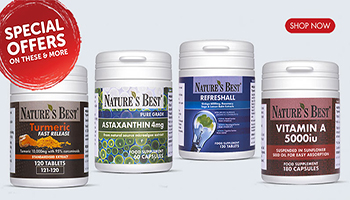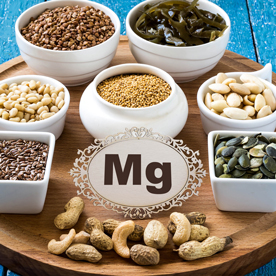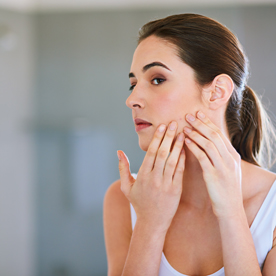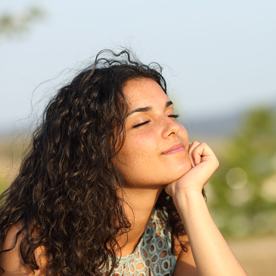
Having the occasional spot is something many of us have experienced, especially during our teenage years. But if you have acne, you may be confronted with more severe and persistent spots daily. Aggressive, painful acne can develop from blocked pores, otherwise known as blackheads or whiteheads, causing what doctors refer to as papules, pustules, nodules and cysts.
It should come as no surprise that acne can be an emotionally taxing symptom of PCOS. For many women, it can affect confidence, body image, and overall sense of wellbeing. Fortunately, there are many tried and tested natural remedies available to control acne and improve skin health – rather than letting your skin control you.

Acne: a brief overview
Acne is most prevalent amongst teenagers, with one study finding 20 per cent of young people will experience moderate to severe acne i. But adults aren’t immune; 64 per cent of people in their 20s, and 43 per cent of those in their 30s will be affected by acne in varying degrees i.
Although having spots on your face, back or chest isn’t a major health concern, the effect on mental health can be devastating. In particular, facial acne is widely touted to compromise self-esteem since it’s the most visible and, therefore, hardest to cover up. Making a conscious effort to optimise your emotional health is essential if you experience this symptom of PCOS.
A survey conducted by the British Skin Foundation purports a lack of confidence is just the tip of the iceberg ii. Amongst those surveyed with acne, 20 per cent experienced a relationship breakdown as a result of it; 10 per cent said they had been unfairly dismissed at work because of their acne; and more than half claimed they had experienced verbal abuse from friends, family and others owing to their skin condition.
Acne and PCOS
Acne is one of the most common symptoms of PCOS. One study suggests 27 per cent of all women with acne also have PCOS; another claims 67.5 per cent of women with PCOS have acne iii. Given so many healthcare professionals believe women aged 25 or older with persistent acne should be assessed for PCOS, it’s critically important to understand the link between acne and the condition, so you can manage it effectively.
If you have PCOS-related acne, you will generally have spots in hormone-sensitive areas, like your cheeks, jawline, chin and upper neck. You’re also more likely to breakout in nodules and cysts than papules and pustules. It’s worth noting that spots may flare up when your period is due, and they may take some time to calm down.
There are several reasons why PCOS leads to acne. Chiefly, hormones called androgens cause acne. These so-called ‘male’ hormones include testosterone, androstenedione, dehydroepiandrosterone (or DHEA) and DHEA sulphate. High androgen levels, also known as hyperandrogenemia, are one of the three main characteristics of PCOS, though not all women with the condition are affected.
High levels of androgens lead to acne because it makes the sebaceous glands in your skin produce too much oil. This, along with a build-up of dead skin cells, blocks your pores and triggers comedones (skin-coloured, small bumps) to develop. The excess oil also affects a bacterium that lives on everyone’s skin called Propionibacterium acnes, causing it to multiply. This, in turn, triggers inflammation and the development of acne spots.
Another feature of PCOS is insulin resistance. This occurs when the body doesn’t respond normally to the hormone insulin, resulting in high blood levels of insulin. Insulin resistance has also been linked to high levels of androgens since surplus insulin prompts your ovaries to overproduce testosterone. Some experts believe PCOS could be linked to low-grade inflammation in the body, which may play a part in the development of the larger acne spots, specifically nodules and cysts iv.
Management options
Medical interventions
You can treat mild cases of acne with over-the-counter pharmacy products, like creams, gels and lotions containing benzoyl peroxide, azelaic acid, salicylic acid or glycolic acid. However, if you have PCOS-related acne, you may find these standard acne treatments aren’t especially effective.
You may be better suited to the combined oral contraceptive pill, which is known to reduce androgen levels. You may be prescribed one particular brand of pill named co-cyprindiol (often marketed as Dianette) as it contains the anti-androgen ingredient, cyproterone. However, since co-cyprindiol has a higher risk of deep vein thrombosis than other oral contraceptives, it’s usually only recommended when other treatments fail.
Natural remedies
Eating a healthy balanced diet, packed with plenty of fresh fruit and vegetables is essential to support your skin and overall health. Limiting your intake of androgen-boosting foods, like alcohol, caffeine, sugar, and saturated fats can help, too. Furthermore, try to cut back on treats made with hydrogenated fats – also known as trans fats. Found in many processed items, these foods may cause the inflammation associated with acne. With this in mind, try to limit how many biscuits, cakes and pastries you eat.
Another helpful addition to your skin health arsenal is eating more omega-3-rich foods, such as salmon, herring, pilchards and sardines. Omega-3s are believed to reduce oil production in your skin. One study proposed fish oil supplementation may lead to overall improvements in acne severity v.
There’s also evidence the following nutritional supplements may help control acne:
Vitamin B5 (pantothenic acid) for acne
Also known as pantothenic acid, vitamin B5 may support the reduction of acne since it decreases the amount of oil produced by the sebaceous glands in the skin. It does this by boosting coenzyme A, which increases the metabolic breakdown of oils, including sebum, through supporting the normal activity of cell physiology.
Dr Lit-Hung Leung first introduced the idea of taking vitamin B5 to support skin health and improve acne in 1997 vi. More recently, a study found volunteers who took 2.2g of vitamin B5 every day for 12 weeks had fewer spots and improved skin quality compared to those who took a placebo vii. The researchers claimed this was the case for two reasons: vitamin B5 has both skin-softening and antibacterial properties.
To support your overall skin health, we recommend taking a slow-releasing vitamin B5 supplement that packs 500mg.
Zinc for acne
Although zinc is often lauded for its role in immunity, it’s also one of the most widely studied forms of acne treatment viii. Zinc has powerful properties that may relieve some of the irritation and redness associated with moderate-to-severe acne. Some proponents even believe it may help reduce scarring.
In one study, researchers reported that zinc supplementation was effective for treating bacterial and inflammatory forms of acne ix. Another investigation found zinc was beneficial for those with mild acne, too x.
We suggest taking 15mg zinc daily to improve your complexion and help to manage acne breakouts.
Selenium for acne
Antioxidant supplements that contain selenium may also prove useful for acne. Selenium works synergistically with other nutrients, like zinc and vitamin E, to support skin health.
Empirical data suggests selenium increases the body’s overall antioxidant levels, which may contribute to the reduction of acne xi. One study proposes selenium may directly minimise inflammatory acne xii. Notably, selenium functions in glutathione peroxidase – an antioxidant enzyme that may help to prevent acne xiii.
For optimal skin health, look for quality formulas that deliver 200µg of selenium.
Vitamin D for acne
A growing body of data suggests low vitamin D levels can impact more than just your bones; it can affect your skin, too. Experts report a compelling link between acne and poor vitamin D reserves xiv.
In one study, researchers found a 50 per cent vitamin D deficiency amongst participants with acne, compared to only 23 per cent in the control group xv. Another study corroborated these results, highlighting that supplementation of 1,000iu of vitamin D for 2 months considerably improved acne lesions in people with a deficiency xvi.
With this in mind, we recommend adding Vitamin D3 1,000iu to your diet.
Green tea extract for acne
A potent antioxidant, green tea has demonstrated immense promise in supporting overall skin health and diminishing acne lesions xvii.
Researchers reported women with moderate to severe acne who took a 1,500mg supplement of green tea extract for 4 weeks exhibited a significant reduction in acne breakouts, compared to the control group xviii.
To nourish skin, we highly advise taking a premium-grade, high-strength green tea extract supplement that packs 5,000mg.
As always, we recommend speaking to a health professional or Nutrition Advisor before embarking on a new supplement programme. Explore the rest of our PCOS hub to learn more about how you can manage your PCOS symptoms effectively and safely.
References:
-
Bhate, K., Williams, H.C. Epidemiology of acne vulgaris. Br J Dermatol. (2013 Mar). ;168(3):474-85. Available online: https://www.ncbi.nlm.nih.gov/pubmed/23210645?dopt=Abstract
-
Over half of acne sufferers experience verbal abuse from friends & family due to their condition. British Skin Foundation. (2014-2015). Available online: http://www.britishskinfoundation.org.uk/LinkClick.aspx?fileticket=i2bE2n4c8m0%3d&tabid=172
-
Kelekci, K.H., et al. Ovarian morphology and prevalence of polycystic ovary syndrome in reproductive aged women with or without mild acne. Int J Dermatol. (2010 Jul). ;49(7):775-9. Available online: https://www.ncbi.nlm.nih.gov/pubmed/20618496
Gowri, B.V., et al. Correlation of Skin Changes with Hormonal Changes in Polycystic Ovarian Syndrome: A Cross-sectional Study Clinical Study. Indian J Dermatol. (2015 Jul-Aug). ;60(4): 419. Available online: https://www.ncbi.nlm.nih.gov/pmc/articles/PMC4533553 -
Deluba, A.J., Dokras, A. Is PCOS an inflammatory process? Fertil Steril. (2012 Jan). ;97(1):7-12. Available online: https://www.ncbi.nlm.nih.gov/pubmed/22192135
-
Khayef, G., et al. Effects of fish oil supplementation on inflammatory acne. Lipids Health Dis. (2012). ;11: 165. Available online: https://www.ncbi.nlm.nih.gov/pmc/articles/PMC3543297
-
Yang, M., Moclair, B., et al. A randomized, double-blind, placebo-controlled study of a novel pantothenic Acid-based dietary supplement in subjects with mild to moderate facial acne. Dermatol Ther (Heidelb). (2014 Jun). ;4(1):93-101 . Available online: https://www.ncbi.nlm.nih.gov/pubmed/24831048
-
Leung, L. Pantothenic acid deficiency as the pathogenesis of acne vulgaris. Medical Hypotheses. (1995). 44(6), 490-492
-
Sahib,, A., et al. Effects of Oral Antioxidants on Lesion counts Associated with Oxidative Stress and Inflammation in Patients with Papulopustular Acne. FJ Clin Exp Dermatol Res. (2012). 3:163.
-
Decker, A. & Graber, E.M. Over-the-counter Acne Treatments: A Review. The Journal of clinical and aesthetic dermatology. (2012). 5(5), 32–40.
-
Sardana, K. & Garg, V. An observational study of methionine-bound zinc with antioxidants for mild to moderate acne vulgaris. Dermatologic Therapy. (2010). 23(4), 411-418.
-
Tinggi, U. Selenium: its role as antioxidant in human health. Environmental health and preventive medicine. (2008). 13(2), 102–108.
-
AlAnbari, H., Sahib, A., et al. Effects of silymarin, N-acetylcysteine and selenium in the treatment of papulopustular acne. Oxidants And Antioxidants In Medical Science. (2012). 1(3), 201.
-
Baker, R., Baker, S., et al. Selenium Regulation of Glutathione Peroxidase in Human Hepatoma Cell Line Hep3B. Archives Of Biochemistry And Biophysics. (1993). 304(1), 53-57.
-
Stewart, T.J. & Bazergy, C. Hormonal and dietary factors in acne vulgaris versus controls. Dermato-endocrinology. (2018). 10(1), e1442160.
-
Lim, S.K., Ha, J.M., et al. Comparison of Vitamin D Levels in Patients with and without Acne: A Case-Control Study Combined with a Randomized Controlled Trial. PloS one. (2016). 11(8), e0161162.
-
Lim, S. Comparison of Vitamin D Levels. (2016). e0161162.
-
Ohishi, T., Goto, S., et al. nti-inflammatory Action of Green Tea. Anti-Inflammatory & Anti-Allergy Agents In Medicinal Chemistry. (2016). 15(2), 74-90.
-
Lu, P. & Hsu, C. Does supplementation with green tea extract improve acne in post-adolescent women? A randomized, double-blind, and placebo-controlled clinical trial. Complementary Therapies In Medicine. (2016). 25, 159-163.
Related Posts?
Disclaimer: The information presented by Nature's Best is for informational purposes only. It is based on scientific studies (human, animal, or in vitro), clinical experience, or traditional usage as cited in each article. The results reported may not necessarily occur in all individuals. Self-treatment is not recommended for life-threatening conditions that require medical treatment under a doctor's care. For many of the conditions discussed, treatment with prescription or over the counter medication is also available. Consult your doctor, practitioner, and/or pharmacist for any health problem and before using any supplements or before making any changes in prescribed medications.

Olivia
Olivia Salter has always been an avid health nut. After graduating from the University of Bristol, she began working for a nutritional consultancy where she discovered her passion for all things wellness-related. There, she executed much of the company’s content marketing strategy and found her niche in health writing, publishing articles in Women’s Health, Mind Body Green, Thrive and Psychologies.
View More



